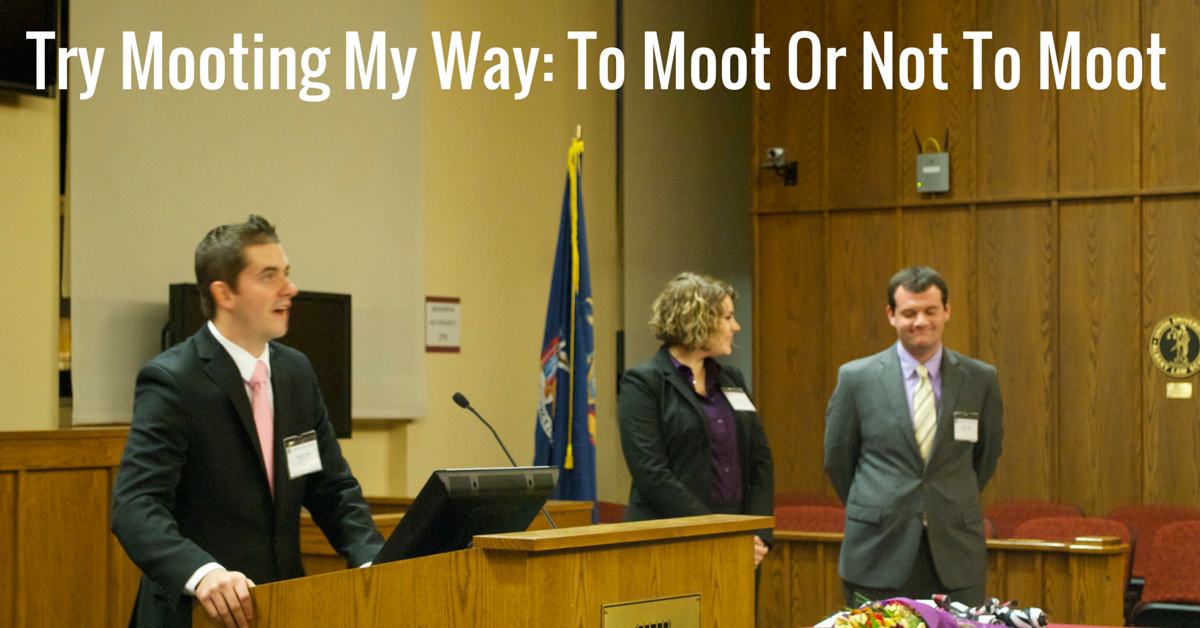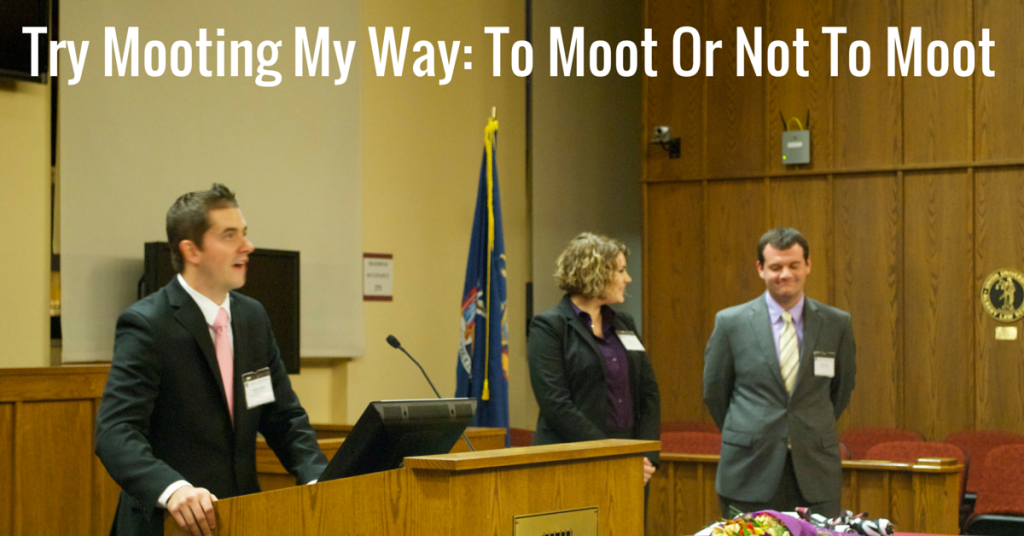I always thought that people attach undue importance to mooting in law schools. It’s a very interesting activity, a great learning opportunity and potentially a lot of fun. However, I always failed to understand why a lot of people make it sound like as if it is a matter of life and death, why mooters miss meals and stop bathing during internal selections and why they are treated like royalty by some people. I have heard even some seniors well placed in good law firms sound nostalgic and sad about how they could have excelled in mooting and how due to unavoidable turns of destiny their mooting potentials could not fructify.
All the hue and cry over mooting seems hilarious to me at times. I want to discuss in this post some of my experiences and shortcuts I successfully exploited while mooting, but I would like all the potential mooters reading this to see mooting for what it really is, and not as a hallowed activity that one must undertake to join the ranks of “law school studs”; mooting is certainly not a do or die situation in which any trick can be justifiably deployed for the slightest advantage over others, neither is it to be pursued at the cost of health, mental stability and other important things in life (read CGPA).
Why would one want to moot?
I would try to jot down all the reasons I can think of. Firstly, it’s a great co-curricular activity for would be lawyers – no matter whether you want to join the litigation or something else. You learn basic skills like drafting, researching, preparing a speech, working in a team. It is also an opportunity to learn to be competitive while being fair to your competitors. This is a first lesson in the balancing act that a lawyer so often does in professional life.
The other great thing about mooting is networking. Not only professional networking, but mooting exposes you to a lot of interesting people from other law schools, students and faculty, and going to a good moot essentially means you can see some good people in action and pick up essential traits and skills. You also make contacts that can help you later on – in your career or something else. I know people who have got married after meeting in a moot. If you go to a moot and meet no one interesting at all, you are missing the entire point.
My personal favourite reason for mooting is travelling. Not only do you get to travel, mooting is a whole new way of travelling. Firstly, you travel with a team – who are either your friends or more usually a few people you have to work with because they also qualified for the team. Travelling with people you barely know can always throw up a lot of surprises. Many of these surprises are often pleasant. Secondly, it is highly likely that someone will sponsor your expenses partly or fully when you are travelling for a moot.
What are the bad things about mooting?
The worst thing is that people tend to get neurotic about it. Social prestige, recognition, even the reason for existence for some people – everything tends to get inextricably linked to mooting. People consider themselves as failures after a loss or a disastrous internal round. I have seen people go into clinical depression because they could not submit a memo as a result of a sudden laptop crash (ever-unpredictable Windows – happened to me too) or some other problem. Secondly, it throws a lot of people off their real targets. Why are you in law school? Not just to get into the university moot team or even to win a national or international moot. Even if you get all the mooting success you want, it’s not going to automatically take care of other things like the job, academic success or contentment in life for that matter. Accolades will dry up and wither away, then it is you and your career, which is not helped by mooting much if you have been ignoring the rest. Get the balance right and know one thing straight – mooting is just another activity out of the many activities you can pursue to develop your skills.
Anyone with average research skills and decent speaking ability is going to do well as long as they hit the right notes in the problem – it is not rocket science and does not require inborn talent. The skills that are required are often simplistic and always acquirable. Many people will tell you otherwise and glorify the great mooters as geniuses, but my experience says otherwise. There is pretty much a formula people follow year after year to get this success. This formula varies from place to place, from moot to moot. First you need to know what are the parameters by which you will be judged in the moot. This is unlikely to be written anywhere, and if it is written in the scoresheet, don’t go by it. You need to talk to those who have done well in that moot before to figure this out. Therefore, knowing seniors well will help.
And there is a lot of luck involved – anyone who has mooted seriously will vouch for this. One bad judge, one bad day, one careless organiser can make a lot of difference – and many of these things are completely outside mooters.
Do recruiters care about mooting?
The general answer is no. If you have 3 out of 10 CGPA, your mooting track record is not something that is going to save you. If you have done well in academics and other things, mooting can be used to show what an all rounder/ smooth operator you are – that you could handle so many activities successfully. That said, there are instances when mooting can be decisive. It is not unusual to make a solid contact during a moot or to impress a partner of a law firm so much that he writes a recommendation for you. However, this doesn’t happen everyday and it will be best not to bank on something like that! Of course, these days the ranks of new age law firms are filling up fast with ex-mooters. Once while interning in a law firm, I was called by the partner who had newly joined to firm to his chamber. During the conversation, he asked me if I have ever mooted. It turned out that he was a champion mooter himself and a mooter would easily strike a chord with him. So ask me again, do recruiters care about mooting? Not really, not much.
I was sort of averse to mooting for a long time – till my 4th year in fact. I had represented my University in a moot after winning a challenger in my 2nd year, but what I saw in the moot made me more averse to mooting. The judges (mostly High Court lawyers) had come without even reading the problem, and it being a problem based on technology, they did not have much clue about the relevant law either. It was not about winning the case with legal arguments any more, but a question of which team can enact a court room drama better. Arguments went for a toss and it was suddenly all about mannerisms. One would get away with speaking wrong law and citing fake authorities. Someone even cited Google.com as an authority and won the court.
It is not that all moots are like this. Also, with some planning and smart strategy, you can nullify these inefficiencies too. Nevertheless, it is important to not chose one of these bad moots, be careful about where you are going. Not all moots are worth your time.
I changed my mind about mooting in my 4th year. Mooting was not a lot of work for me suddenly, and there were ways to do well without putting my usual lifestyle and other preoccupations at stake. And given the input with which I am comfortable with, the returns are quite high. I shall write about this phase of my short mooting career in the next installment of this series. Meanwhile, if you are looking for credible insights on Mooting, subscribe to this online course here which is developed by some of the best mooters in the country and is sure to help you.
 Serato DJ Crack 2025Serato DJ PRO Crack
Serato DJ Crack 2025Serato DJ PRO Crack











 Allow notifications
Allow notifications



This is really helpful, i couldn’t thank you enough for writing this article. I got rejected by my lecturers because i was not qualified to join the mooting team and i had a hard time trying to recover from that rejection. I felt like my purpose as law student was diminished because i had put in so much of effort and time with hopes that i could ace the selections. Sheer disappointment were all over me after finding out i was not part of the team. However, after reading this article, i am feeling a lot more positive! So thank you! You just made my day!